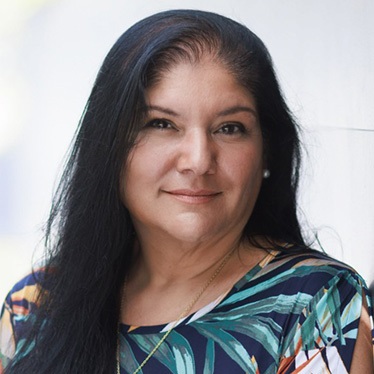In COVID crisis, Humphrey fellow sees opportunity for educators
June 8, 2020
La Prensa
 As the novel
coronavirus pandemic unfolded, Humphrey fellow Barbara Cecilia Barrios Dumanoir
quickly saw a connection between the public health crisis and her interest in technological
literacy.
As the novel
coronavirus pandemic unfolded, Humphrey fellow Barbara Cecilia Barrios Dumanoir
quickly saw a connection between the public health crisis and her interest in technological
literacy.
“Teaching using technological tools is very different than (in-person) classes, and we cannot use the same methodology,” she wrote in Spanish for the newspaper La Prensa. “It is necessary to adapt the classes to the remote and virtual environment, thinking that we are in a scenario that is out of our control and that we need to create a new education ecosystem.”
The executive director of the United Nations Population Fund and a United Nations data analyst at least one other expert in international planning retweeted a link to Barrios’ May 20 article, “Panama: The Educational Challenge” (“Panamá: El reto educativo.”) The article also has led to a radio interview and an invitation to lead an online workshop on the topic.
At the invitation of Panama’s Ministry of Education, Barrios facilitated a training session about creating online courses. The early May Zoom event drew 42 teachers. “Teachers and professors are interested,” she said. “They just need the tools to facilitate their work.”
After Humphrey Fellow Douglas Lopez of Venezuela contacted Barrios about her work, they and Fellow Angelica Rocha of Guatemala began planning a webinar called “Leadership and Innovation in Virtual STEAM Teaching for Higher Education.” When they return to their countries they plan to continue collaborating to improve remote/virtual education knowledge. Lopez and Rocha were fellows at Penn State University.
In Panama, “some provinces lack infrastructure,” Barrios said. “Not everyone has access to computers or internet or even a cellphone. In other places they don’t have human resources. A student of mine was a high school principal. They had computers but no computers to teach.”
Educators everywhere should think more broadly about teaching options, she said. “Many times when we think about remote education we think the only tools are the internet and computer and phone, but before then we had radio and TV.”
There’s a lesson for the United States and other countries, she said. The Catholic Church in Panama, for example, has used radio for education for years. “The radio stations give free time to reach people who live in very difficult areas where people cannot attend schools,” she said. “Many of those places do not have electricity, but they have radios that can be used with batteries.”
Barrios had planned to go to New York for her professional affiliation at the United Nations Family Planning Agency (UNFPA). Because of New York’s stay-at-home orders, she completed that work remotely.
She worked on a project creating interactive maps that show where African descendants live in Latin America and the Caribbean to target programs that will improve access to education and opportunities. A second project reviewed progress on the 1994 Nairobi Statement, which emerged from the United Nations’ International Conference on Population and Development. Goals of that conference focus on universal education; infant and child mortality; maternal mortality; and reproductive and sexual health services.
As a fellow, she volunteered at Syracuse’s Seymour Elementary School, where she learned library and computer practices she hopes can be applied to schools in Panama. She also worked on parent engagement with MANOS, a dual language program for 3- and 4-year-olds. She also served as an interpreter (English/Spanish) and translated forms to Spanish.
She hopes the unexpected shift to online teaching sets new standards and spurs innovation.
“Teachers and professors from public and private schools should be offered training to adjust their teaching plans, and to learn how to use the advantages of technology,” she concluded the La Prensa article. “This situation can be used as an opportunity to tackle the gaps and we should be able to advance.”
06/08/20
Related News
School News

Dec 19, 2024
School News

Dec 11, 2024
School News

Dec 10, 2024
